By Steve Phillips / Photos courtesy of the Hartford Yard Goats
Dizzy Bat Races. Kids put their foreheads on bats standing up off the ground and spin around 10 times as fast as they can before racing to a finish line to win a prize.
Cow-Milking Contests. Players, in full uniform, race to see if they can fill up a can while milking a cow. The winning team gets bragging rights in the clubhouse.
Race Around the Bases. Two kids are selected out of the stands and race each other running around the bases in opposite directions. The winner can earn free tickets to another game and autographed gear.
Dirtiest Car in the Parking Lot. One car is selected from a search of the parking lot as the dirtiest of them all and the owner wins a free car wash from a local vendor.
These are a few of the many promotions that you could experience while going to a minor league baseball game. Minor league baseball is as entertaining as major league baseball, just in a different way. The best way to describe minor league baseball is that there is a party at a stadium and there just happens to be a ballgame going on at the same time.
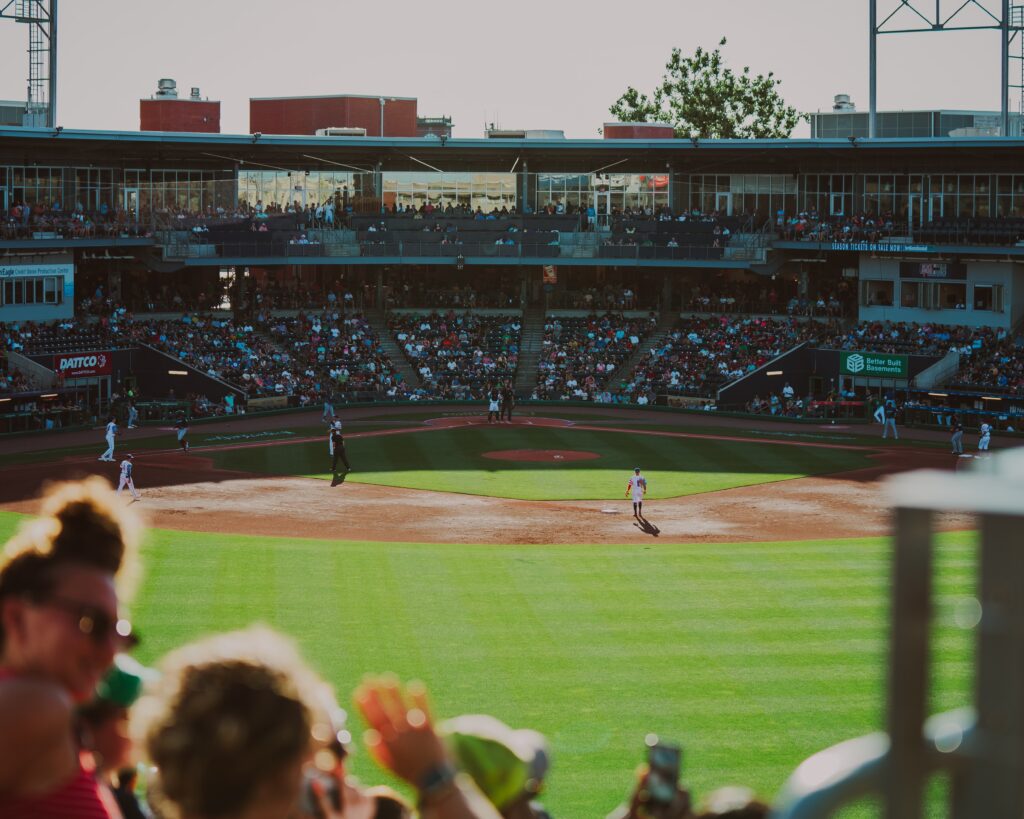
In Connecticut, the Hartford Yard Goats is the one minor league baseball team remaining. They play at Dunkin Donuts Park in downtown Hartford, which is located at the junction of highways 84 and 91. Seating over 6.000 people, it presents itself as a small major league stadium as opposed to a big minor league stadium with a second deck and concourses that go all around the playing field like most major league facilities.
“The stadium has become the centerpiece of downtown Hartford,” said Jeff Dooley, the director of media relations and the voice of the Yard Goats. “Not only do we get families and pure baseball fans, but we also get young professionals and college kids. It is a gathering point where they can meet up with friends.”
The game itself in minor league baseball can’t compare to the quality of play in Major League Baseball. The players in the minors are as fast and as strong as players in the majors. The pitchers throw as hard. The difference in play is about the consistency of the performance of the players. Minor leaguers don’t execute as consistently as the big leaguers. They make more physical and mental mistakes. To compensate for that lower level of performance, minor league teams enhance the entertainment with fun promotions and gimmicks: theme nights, giveaways, concerts, fireworks, meet and greets, and more.
Most minor league teams are affiliated with major league franchises. The players on these teams are employees of the 30 major league baseball teams. There are also independent leagues that are deemed professional since the players get paid, but the players are not affiliated with major league teams. Most of these players hope to play well enough to be signed by a major league organization. Some players in independent ball were once affiliated with a major league team but have since been released and just want to keep playing the game they love.
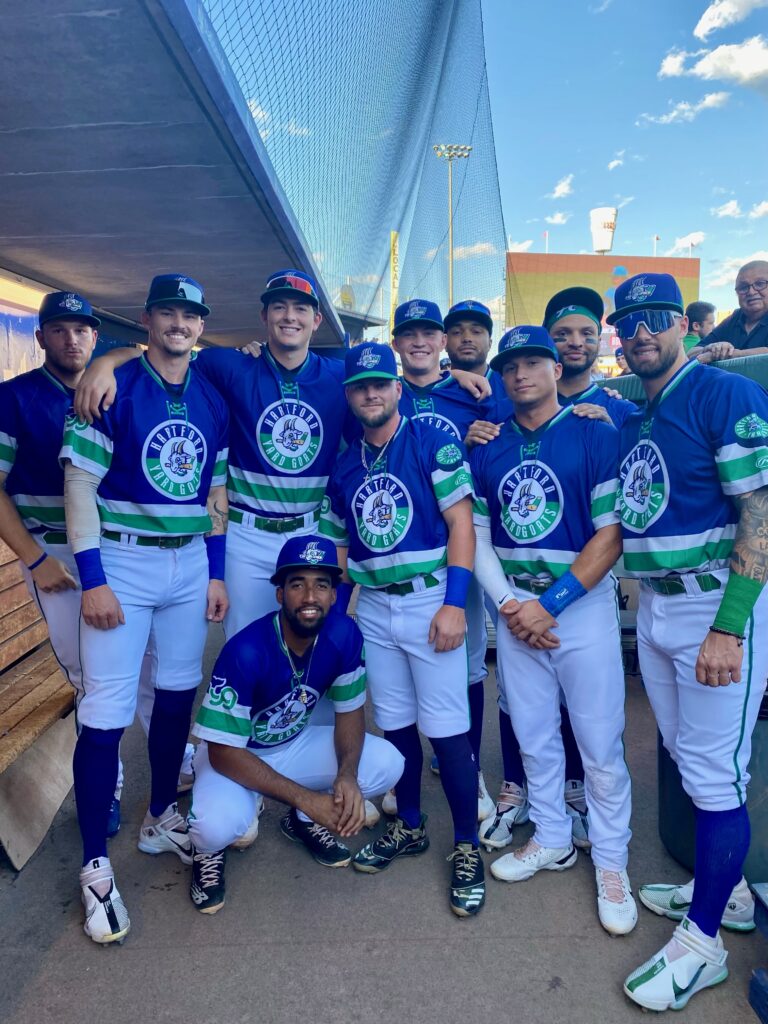
Minor league teams tend to be located in smaller towns and cities across the country. The upper levels of the minor leagues—where the players are developmentally closer to being ready for the major leagues—tend to be located in the larger cities while the greenest and youngest players compete in smaller towns. The idea is that the less experienced and younger players need to develop as players on the field and off the field. Smaller markets are more protective and safer for the 18- and 19-year-olds, while the older more mature players learn how deal with life’s challenges in bigger markets.
I played seven years in the minor leagues with the New York Mets and Detroit Tigers organizations back in the day in Tennessee, New York, South Carolina, Virginia, Mississippi and Florida. That was when quarter beer night was always a sell out and seemed like a good idea at minor league stadiums. Times have changed. (By the way, I was pretty good at milking a cow for a kid from Detroit, Mich.)
I just couldn’t get enough of the popcorn, peanuts and Cracker Jack. I have eaten a lot of hot dogs over the years. The food options at ballparks have expanded beyond belief; now you can get sushi, grilled chicken, corn on the cob, pulled pork or BBQ brisket, salads, and more.
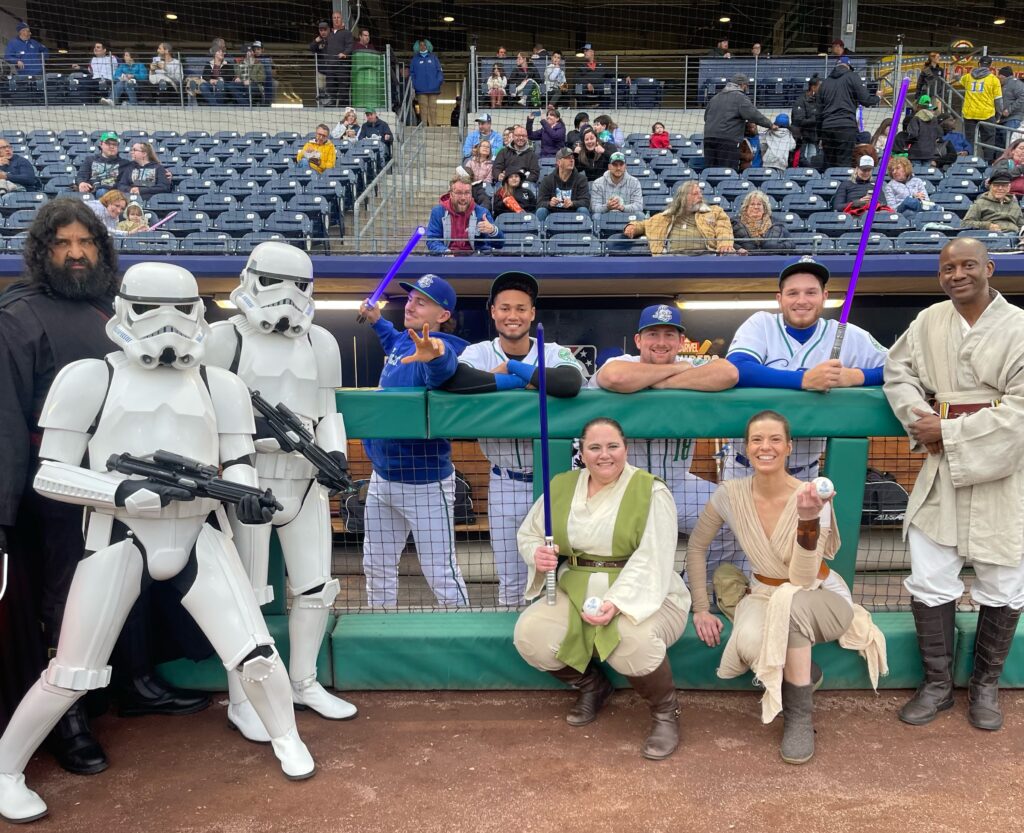
Major league organizations want their players to improve and develop on the field while playing at each level of the minors. But they also want players to learn to be responsible citizens and members of the community. Minor league teams often send their players out in the communities for meet-and-greet events. The players go to schools, hold clinics, represent the team at chamber of commerce events and more. Heck, I even judged a beauty contest and walked the runway in a fashion show on behalf of the team in my minor league days. The events were fun, but they also taught me and my teammates that we have an opportunity and responsibility to make an impression on fans of all ages.
Minor league franchises don’t rely solely upon the play on the field to entertain their audience. The players often change from year-to-year. The better the team, the less likely the players will return as they will likely be promoted to the next level. The minor league teams have no say in who will be on their rosters. The major league organizations decide on which players play where. The teams will be good or bad, and each minor league affiliate has to accept it. So, it behooves the minor league affiliates to be all about the fan experience. This means that what happens between the innings on the field can be more important to the club than what happens on the field during the actual baseball action.
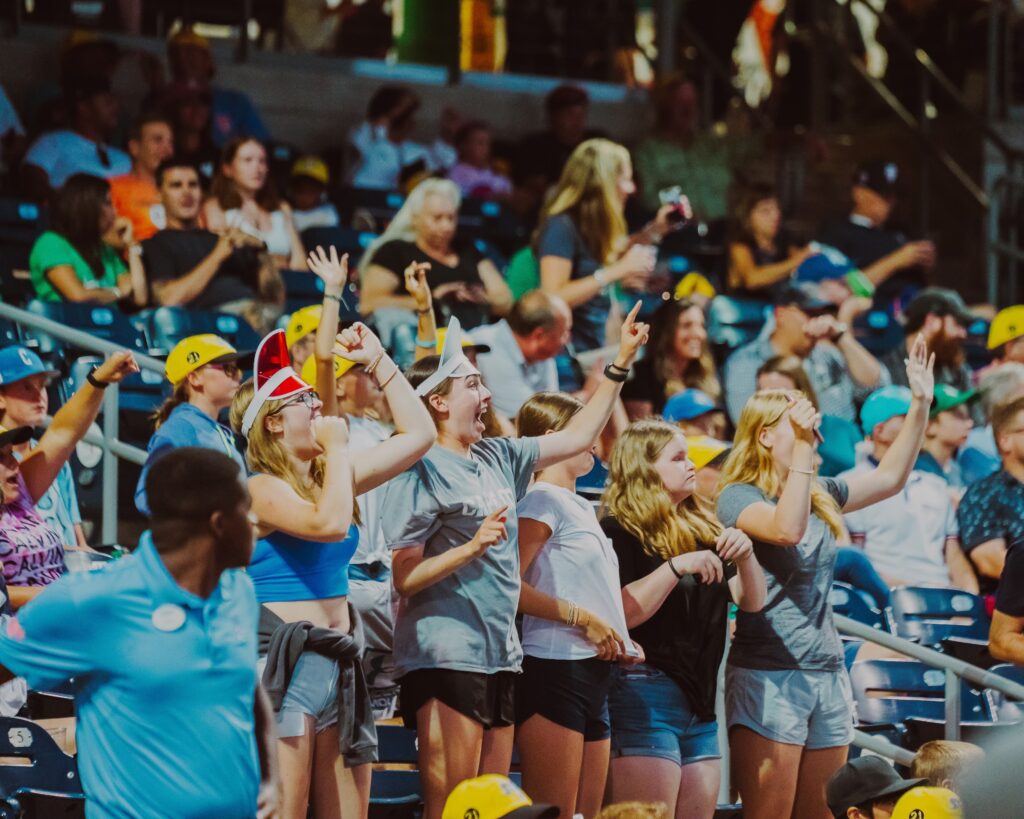
Mascots are often the most popular uniformed personnel. Younger kids care less about the score of the game than they do getting a high five from the team mascot.
I went to a Hartford Yard Goats game last summer. The Yard Goats are the Class AA affiliate for the Colorado Rockies. It was zombie night at the ballpark. Employees and fans dressed as zombies. I was shocked at the fan participation. The assistant general manager even he had to leave mid-conversation with me to go on the field to shoot t-shirts out of the air cannon into the stands. Rob Base, a 90’s hip-hop legend, gave a post-game concert on the field geared toward the moms and dads who brought their kids to the game. I have never seen more adults singing and dancing and mortifying their children—kids saw a side of their parents they had no idea existed.
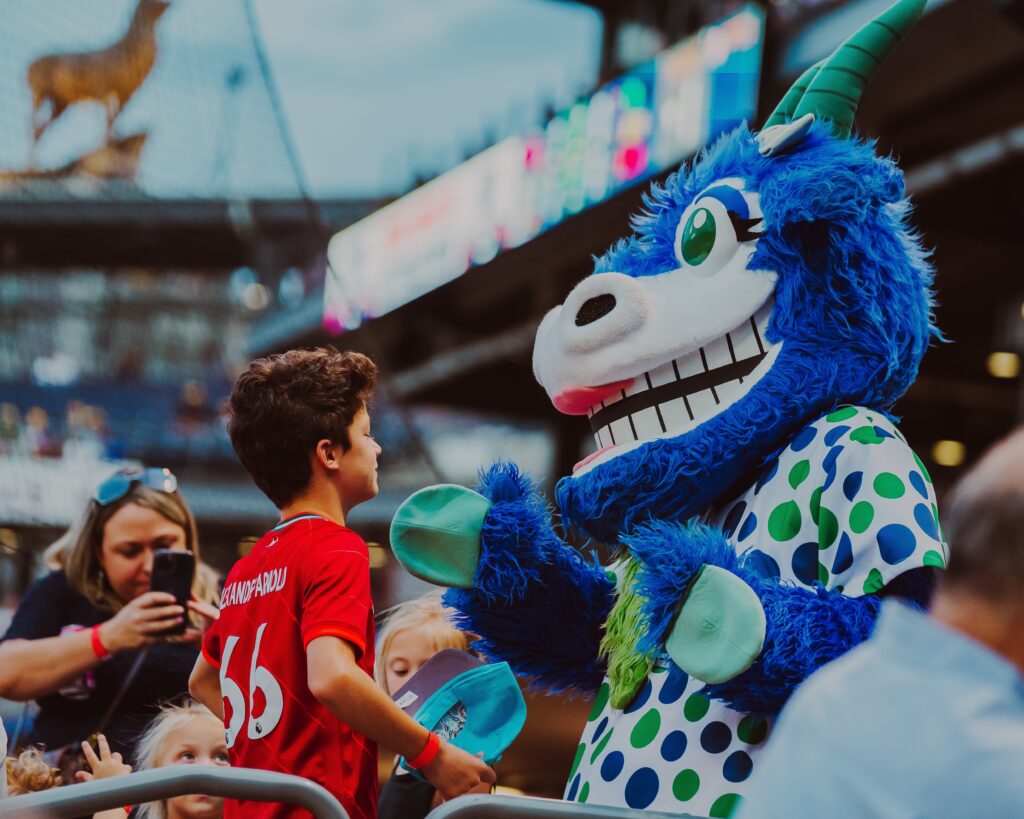
“We are in the business of making people smile,” said Dooley. “People can leave their worries behind and enjoy themselves at Dunkin Donuts Park. We can’t control the team on the field, but we can make sure the party at the ballpark is entertaining.”
The Yard Goats have a firework show every Saturday night during the season. Kids can run the bases every Sunday. They have a promotion for just about every game of the season. It could be a t-shirt give away, bobble head night or theme night. There is a Star Wars night, Marvel Defenders of the Field night, video game night and pajama party night among the numerous promotions at Dunkin Donuts Stadium. And, yes, there are live goats for the kids to pet at the ballpark as well.
The baseball aspect of the experience is not insignificant. It is an opportunity for baseball fans of all ages to get closer to the players on the field as they are more accessible at the ballpark than major league players. Not all of the players who have or will play in Hartford will become major league players, but some will. Last season, four of the Hartford Yard Goats players were promoted to the major league team, the Colorado Rockies, including the current starting shortstop for the Rockies, Ezequiel Tovar. Kids in Hartford had the opportunity to meet these players and get their autographs; they have a connection now with them that will always be special.
Connecticut offers so many different options for leisure and entertainment. A visit to Dunkin Donuts Stadium should be at the top of the list for your summer plans.
Steve Phillips, a former New York Mets general manager, is a current host of the “Leadoff Spot” on MLB Network Radio on Sirius XM and a baseball analyst for MLB Network, TSN and Stadium Sports.



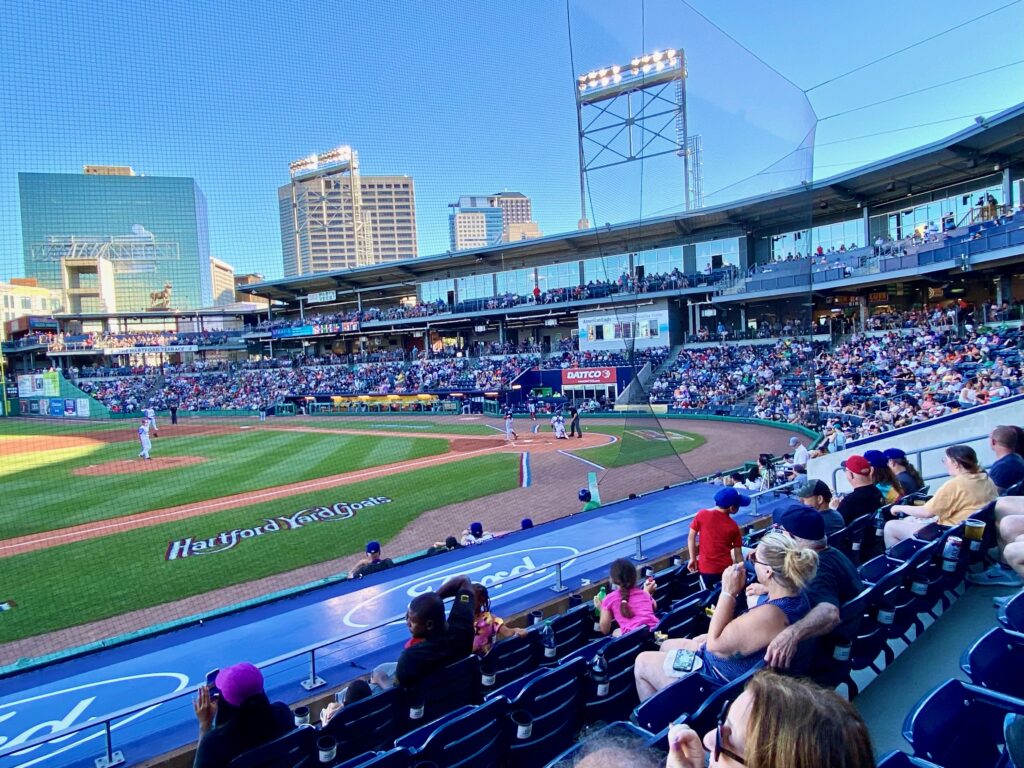




More Stories
Over 50, Underestimated: The Grandfluencers Redefining Age on Social Media
Building Resilient Businesses: Strategies for Success
Summer Means Convertibles